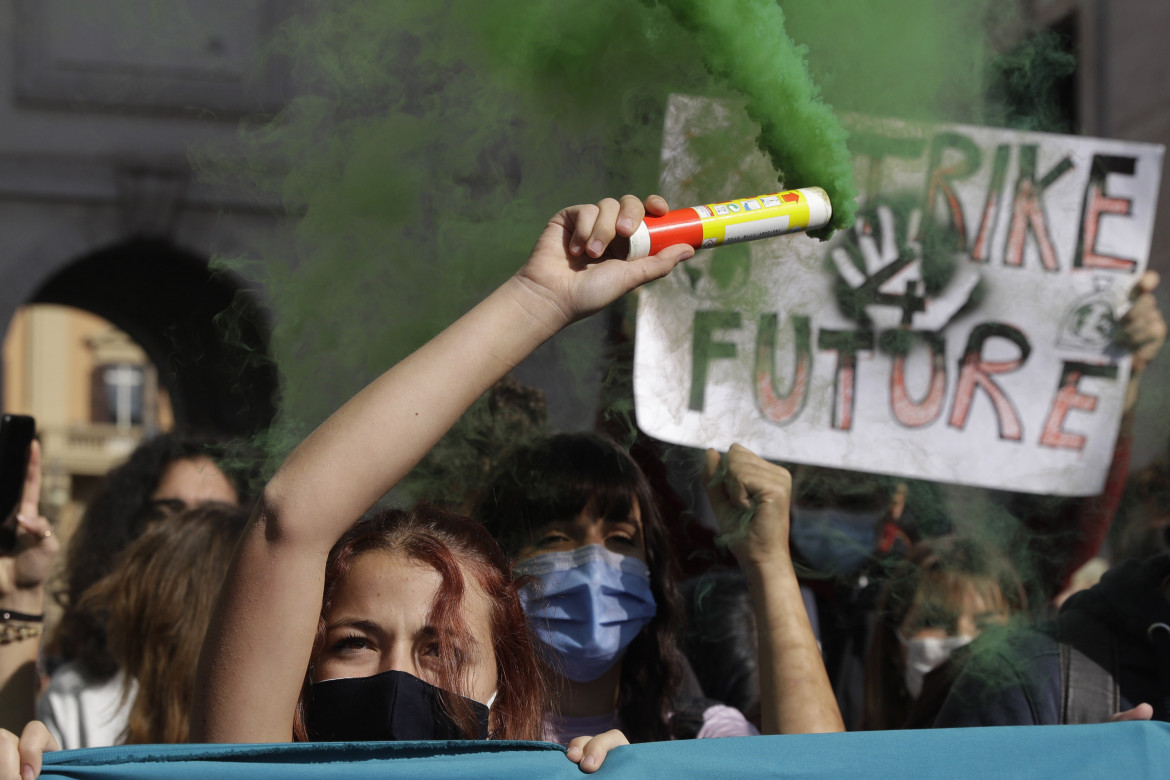Commentary
Anti-fascism and anti-capitalism, the thread connecting April 25 and May 1
The Palestinian flag has inspired antagonism, a desire for rebellion. It is a necessary and urgent task to transform this anger into struggle over working conditions.

The echoes of the great April 25 demonstrations have not yet died down, and we have reached the date symbolizing the rise of workers, class autonomy and the sense of dignity of labor. The proximity of May 1 and Liberation Day is a very fitting one, because at last, the reflections that come naturally on this occasion are those on the big questions. Not only for Italy, but for the digital age.
In the aftermath of the great march in Milan, writer Giacomo Papi observed that among the thousands of voices that spoke up from among the 200,000 participants, very few, if any, spoke about the exploitation of labor and the miserable condition of youth employment. He added that the Palestinian flags were the “only real symbolic and identity-forming glue for the youth protest.”
We, the veterans of the struggle for labor rights, have a tendency to immediately ask ourselves: how do these kids claim to stand up for the rights of others and forget, or don’t want to know, about standing up for their own rights? In reply, others have suggested a more complex picture. The young people feel a sense of identification with the Palestinian people, they feel its fate is similar to their own: namely, that of not having a future they can hope for.
True, the climate catastrophe has helped reawaken the old obsession with the “no future” message, but it would be wrong to underestimate the role that the issue of work may have played in causing this despair.
Because we are now on the other side of precariousness, the gig economy, the working poor: we have entered a system in which the concept of “work” is no longer linked to a life project and a professional identity, while at the same time the social existence of humanity is being reduced more and more to mere consumption.
But then someone might point out: “There’s no point in repeating these things once again. Look around: labor was right there at the protest. For instance, those marching behind the FILCAMS CGIL banner: women and men working in commerce, catering and tourism filling the street. They were there in place of what in the 1970s used to be the white overalls from Pirelli or the blue overalls from Breda.”
It’s certainly true: this is the workforce of today’s Milan, the Milan of restaurant kitchens, home deliveries, events (the Fuorisalone just ended, more and more lurid every year); as well as those who don’t even manage to get five days of work with paid social security contributions in a year.
This is the Milan of professional firms, including those of renowned architects, which keep people in perpetual internships and make them sign design drawings with falsified data to get building permits. That of the municipal employees and workers for city utilities, who can’t make ends meet on just €1,800 per month before tax. It is the Milan of the large-scale retail brands: Auchan, Carrefour, Coin, Decathlon, Despar, Esselunga, Ikea, Leroy Merlin, Metro, OVS, Pam, Panorama, Rinascente, Zara, etc., who waited until April 22 this year to sign a collective contract replacing the one that expired in December 2019! For the whole duration of the pandemic, they made people work with an expired contract, and if they even agreed to negotiations, they promised workers a pittance, to the tune of €70, so they could go on for another year without signing.
When put under the spotlight, these stories paint such a miserable picture of the kind of entrepreneurship and management that is governing the current capitalism that the word “anti-fascism,” as much as it’s been giving us a fuzzy feeling these days, almost seems like something out of a comic book. How, indeed, can one utter it and not think of the three deaths on the job every day (according to INAIL data presented at the World Workplace Safety Day)? How can one not think of Stellantis and the Elkann family, dispossessing Italy of an entire strategic sector? How can one not think about Armani selling €5,000 bags that may have been made by Chinese workers for a few euros an hour?
How can one not think of the big names in international logistics (Geodis, DHL, La Poste) subcontracting to pseudo-cooperatives and LLCs, in order to avoid paying VAT and pension contributions?
Tax evasion in Italy is essentially built on irregular labor rather than undeclared income.
Going back to our earlier considerations, we can only conclude by saying: the Palestinian flag has inspired antagonism, a desire for rebellion. It is a necessary and urgent task to transform this anger into struggle over working conditions. Because, just like in 1945, this is once again about saving the country, ourselves, from civil and economic destruction. And in this way, those young people may yet have a future.
Originally published at https://ilmanifesto.it/antifascismo-e-anticapitalismo-il-filo-tra-le-due-feste on 2024-05-01
